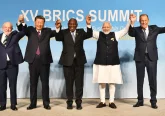Ghana goes to the polls on December 7th. However, for the first time in 24 years, the major stakeholders—including the Electoral Commission (EC) and the leading opposition National Democratic Congress (NDC) party—could not arrive at a consensus over the electoral rules that will govern the election in 2020. Agreed upon electoral rules have historically been critical towards securing a stable electoral process. Amidst the prevailing dispute on the electoral rules, we argue that a tense political climate is building which, if not well managed, could lead up to violent contestation of the results of the December 2020 elections and, in the process, undermine Ghana’s time-honoured integrity as a beacon of democracy in Africa.

Background on the dispute
The dispute over the rules for this year’s election emerged after the Electoral Commission decided to compile a new register for two key reasons. First, the Commission argued that it had purchased a new Biometric Voter Management System (BVMS) to address the problems of manual verification on Election Day. They posited that a new BVMS introduces a new operating system, requiring data migration from the old BVMS. Such data migration could risk losing the names of registered voters.
Second, the Commission emphasized that the existing voters’ register contains the names of voters who either could not constitutionally provide proof of their qualifications in 2008 under previous electoral rules or who registered with documents no longer recognized as acceptable.
Given these technical and legal reasonings, the Commission drafted the new rules to govern the 2020 election by compiling a new voters’ roll in which only passports and National Identification Cards (i.e. Ghana Card) are sanctioned as primary methods of identification. Two citizens who register by these means would, however, be able to function as guarantors for the registration of up to ten other citizens without a passport or Ghana Card.
Nevertheless, the NDC party sued the Electoral Commission in the Supreme Court, calling for the inclusion of the existing voters’ ID card as a primary method of identification to prevent the possible disenfranchisement of a significant proportion of the citizens.
The Court, however, on June 25th, dismissed the NDC’s argument and by so doing ordered the EC to register Ghanaians in line with its new electoral rules (C.I.126). While the Court’s ruling is supreme, it does not address the political grievances which have stalled consensus building. Meanwhile, the absence of consensus in determining the electoral rules makes this year’s electoral season particularly treacherous.
Why consensus was required
In March 1993, the EC established the Interparty Advisory Committee (IPAC) as a consensus-building mechanism. It allows electoral stakeholders to get together to adopt electoral rules via consensus. Such a rule adoption mechanism primarily guarantees the fairness and transparency in the electoral process, making it easier for all to respect electoral results.
However, the IPAC stakeholders did not come to a consensus on the new electoral rules. This is a significant cause for concern, especially with the position of the NDC party before and after the Court’s ruling. The NDC’s presidential candidate, John Dramani Mahama, argued on June 10th that while his party would contribute to a peaceful and smooth electoral process, they would not accept the results of a flawed election. Consistent with this position, Mahama referred to the outcome of the lawsuit as one that “has confounded many legal experts and […] thrown the whole country into a state of confusion.”
Lamenting on the exclusion of the existing voters’ ID card from the voters’ registration methods, candidate Mahama further suggested that the governing New Patriotic Party (NPP) is conspiring with the EC to “exclude the sections of Ghanaians who […] may not renew their mandate at the polls.” While assuring himself and his party of electoral victory with or without a new register, Mahama also alluded to Emperor Haile Selassie’s famous quote that the inaction and indifference of people and the silence of the voice of justice make evil triumph.
Conclusion
These developments are indicative of how consensus deficit on the rules of the game, despite the Court’s ruling, is heightening political tension. Consensus-building enhances the quality and acceptability of the democratic processes of decision-making. This is because inclusivity and intrinsic fairness lie at the very heart of consensus-building. Moreover, through consensus building, conflicting parties come to agree that political rules are categorically right and serve the greatest good and number.
Therefore, the present lack of consensus on the electoral rules, amid perceptions of electoral manipulation, suggests that the NDC party may dispute the outcomes of an election that favours its opponent, the NPP. Considering Mahama’s statements, it appears unlikely that the NDC would address any post-electoral dispute in the court of law. If this undesirable outcome transpires, Ghana’s bourgeoning democratic consolidation may be compromised.







